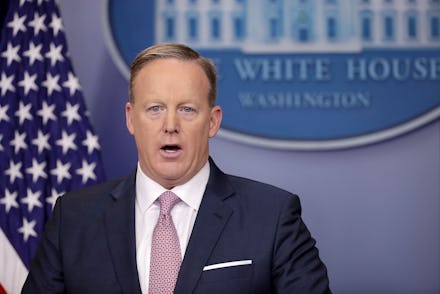Trump's press secretary was asked if he'd try to be honest in his first formal briefing

The first official Trump administration press briefing was pretty much what you'd expect — that is, full of the unexpected.
Three days after Donald Trump took the oath of office — and two days after a defensive alt-factual mini-briefing — the already-embattled new White House press secretary Sean Spicer was asked to take an oath of his own. Reporter Jonathan Karl of ABC News questioned Spicer as to whether he'd guarantee to always speak the truth in the briefing room.
"Is it your intention to always tell the truth from that podium, and will you pledge to never knowingly say something that is not factual?" Karl asked as Spicer waited, looking slightly bemused by the question.
"It is," Spicer replied.
"It's an honor to do this and, yes, I believe that we have to be honest with the American people," he went on. "I think sometimes we can disagree with the facts."
It was a remarkable sally for the first workday face-off of the Trump administration between the press and the president's top spokesman.
It would have been more surprising, and perhaps less necessary, if Spicer, the former flack for the Republican National Committee, and Trump hadn't spent the weekend after the inauguration tearing into the press for supposedly "lying" about the crowd size at Trump's swearing in and otherwise contradicting the official White House line.
Spicer did draw some Twitterverse kudos for trying to flip the script on the reporters that jammed the Brady Press Briefing Room.
He basically did what he gets paid to do: He said in a lengthy counterattack that the media has both made errors in covering Trump and opined that the press seems bent on demonizing the new commander-in-chief.
Prior to Monday's briefing, Spicer took some serious heat for a Saturday blowup at the press that reportedly even ticked off a boss known for bombast. During that session, Spicer slammed reporters for underestimating inaugural attendance and doled out a series of untruths in return before stalking away without taking questions.
This time, he tried a lighter approach, opening the briefing by joking that he'd emailed predecessor Josh Earnest not to worry about losing his title as the most-beloved spokesman among the D.C. press.
"Saturday made me uncomfortable," former Bush White House press secretary Ari Fleischer told CNN of Spicer's performance. "I don't think it was helpful to anybody. Today's the way it should be."
Spicer may have started off easy.
But he proceeded to push back on a pool report that erroneously said Trump had removed a bust of Martin Luther King Jr. from the Oval Office (although he also demanded an apology that had already been given).
He and reporters went at it again on a number of well-trodden issues, including a cascade of photo-accompanied reports that Trump drew nowhere near as many spectators to his Friday swearing in as had his predecessor, Barack Obama, or that a Trump address to members of the CIA was stacked with cheering pro-Trump astroturfers.
Spicer, apparently remembering the old adage that "the best defense is a good offense," sought to turn the media narrative, or maybe the media itself, on its head.
"Over and over again, there's this constant attempt to undermine his credibility and the movement that he represents. It's frustrating for not just him, but for so many of us trying to work to get this message out," he said.
Sometimes, he said, the Trump administration gets to be right: "The default narrative is always negative," he complained, "and that's demoralizing."
Monday's briefing could be a harbinger of what's to come between the press corps already leery of a Team Trump that breaks promises and an administration that has made a (successful) cottage industry of vilifying the "crooked media."
Spicer struck some conciliatory notes on his first formal day at the podium, but to be fair, his top job is to defend his boss, not play nice with the ranks of the American press.
At the same time, reporters who cover this already-unusual administration don't need the Trump crew's cooperation to point out its inconsistencies and outright reversals, from the decision not to release the new president's tax returns to his mind-boggling assertion that it didn't rain at his inauguration.
Can the press and the Trump administration get along? Possibly — but it's not necessary for either to do its job. In any case, the smart money would be on not placing that bet any time soon.
Jan. 24, 2017, 10:00 a.m.: This article has been updated.